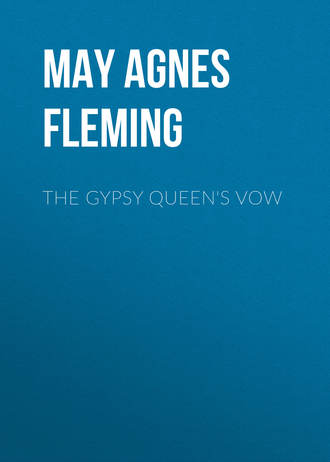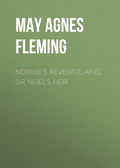
May Agnes Fleming
The Gypsy Queen's Vow
CHAPTER XXIX.
MR. TOOSYPEGS IN DISTRESS AGAIN
The time I’ve lost in wooing,
In watching and pursuing
The light that lies in woman’s eyes,
Has been my heart’s undoing.
Though wisdom oft has sought me,
I scorned the love she brought me;
My only books were woman’s looks.
And folly’s all they’ve taught me.
– Moore.
Admiral Harry Havenful sat alone in the parlor of the White Squall, the heels of his boots elevated on the knobs of the andirons, his chair tipped back to that sublime angle which women admire, but men only understand. A long meerschaum, with an amber mouth-piece, protruded from his lips, while whiffs of blue, vapory smoke curled from the corner of his mouth; his hands stuck in his trousers pockets, and his eyes fixed admiringly on the pink and yellow ship-of-war on the mantel. Admiral Harry Havenful was enjoying life hugely on a small scale, when a dispirited knock, such as moneyless debtors give, was heard at the outer door.
“Tumble up, below there! tumble up, ahoy-y-y!” roared the admiral, taking the pipe from his mouth to summon the servants.
In compliance with this zephyr-like request, one of the darkeys “tumbled up,” accordingly, and on opening the door, Mr. O. C. Toosypegs stalked in, and with the head of his cane in his mouth, entered the parlor and presented himself to the jolly little admiral.
“D’ye do, Orlando? give us your flipper,” said the admiral, protruding one huge hand without rising, or even turning his head, merely casting a glance over his shoulder, and smoking on as placidly as before.
“I’m very well – that is, I ain’t very well at all, Admiral Havenful, I’m very much obliged to you,” said Mr. Toosypegs, grasping the huge hand and wriggling it faintly a second or two. “My health ain’t so good as it might be, and I don’t expect it ever will be again, but I’m resigned to that and everything else that may happen. It’s nasty to be always complaining, you know, Admiral Havenful.”
“That’s so,” growled the admiral, in a tone so deeply bass that it was quite startling.
“Therefore, Admiral Havenful, though I ain’t so well as I might be, I’m very well indeed, I’m very much obliged to you. It must be nice to die and have no more bother – don’t you think so, Admiral Havenful?” said Mr. Toosypegs, with a groan so deep that the admiral took his pipe from his mouth and stared at him.
“What now?” grunted the admiral, who foresaw something was coming; “heave to!”
“Admiral Havenful, would you be so good as not to say that? You mean well, I know, but you can’t imagine the unpleasant sensations it causes – ugh!” said Mr. Toosypegs, with a wry face and a shudder. “You never were sea-sick, were you, Admiral Havenful? If you were, you don’t require to be told the pang that hearing that inflicts upon me. Therefore, please don’t say it again, for it gives me the most peculiar sensations that even was.”
The admiral grunted, and began smoking away like an ill-repaired chimney. Mr. Toosypegs sat uneasily on the edge of his chair, and continued to make a light and rather unsatisfactory repast off the head of his cane. Thus a mournful silence was continued for some fifteen or twenty minutes, and then the admiral took his pipe from his mouth, wiped it on the cuff of his sleeve, and without looking at Mr. Toosypegs, drew a long, placid breath, and held it out toward him with a laconic:
“Smoke?”
“Thankee, Admiral Havenful,” said Mr. Toosypegs, mournfully, “I never do.”
“More fool you, then,” said the admiral, gruffly, putting it in his own mouth again.
“Admiral Havenful,” said Mr. Toosypegs, in a large tone of voice, “I’m aware that I ain’t so wise as some of my friends could wish me; but, at the same time let me assure you that I don’t consider it a proof of wisdom to smoke at all. Smokers mean real well, I know, but it’s unpleasant to others, besides setting the in’ards in a dingy state, blacking the teeth, adulterating the breath, and often producing spontaneous combustion. Which means, Admiral Havenful,” said Mr. Toosypegs, elevating his cane to make the explanation, “getting worked up to a high degree of steam, and going off quite unexpected and promiscuous, some day, with a bang, and leaving nothing behind to tell the melancholy tale but a pinch of ashes, and that – ”
“Oh, bother!” cut in the admiral, impatiently, “Belay your jawing tackle, young man, and let somebody else have sea-room. What port do you hail from last?”
“Admiral Havenful,” said Mr. Toosypegs, in no way offended at this cavalier mode of treating his digression on the evils of smoking, “if you mean by that where I was all morning, I’ve just come from Dismal Hollow. Aunt Prisciller wasn’t in – well, she wasn’t in very good spirits – and so I got out of the back door and come away. I was going to Old Barrens Cottage, only I saw Judge Lawless’ horse before the door, and so I came here.”
“Always welcome, Orlando, boy – always welcome,” said the admiral, briskly. “But hold on a minute! What the dickens brings that stiff bowspirit of a brother-in-law of mine so often to that cottage? Eh, Orlando?”
“I don’t know, I’m sure, Admiral Havenful,” said Mr. Toosypegs. “It’s real singular, too, because he never used to go there at all, and now his horse is at the door every day.”
“So’s yours, for that matter. Hey, Orlando?”
Mr. Toosypegs blushed to the very roots of his hair, and shifted his feet uneasily over the floor, as though it burnt them.
“Orlando,” said the admiral – holding his pipe between his finger and thumb, and regarding significantly these emotions – “Orlando, I see breakers ahead!”
“Admiral Havenful,” said Mr. Toosypegs, in a tone of mingled uneasiness and anguish, “I dare say you do; but, my gracious! don’t keep looking at a fellow so! I couldn’t help it, you know; and I know it’s all my own fault to be miserable for life. I don’t blame anybody at all, and I rather like being miserable for life than otherwise. I know you mean well, but I’d rather you wouldn’t keep looking at me so. I’m very much obliged to you.”
“Orlando,” solemnly began the admiral, without removing his eyes from the other’s face, “you’re steering out of your course altogether. Come to anchor! Now, then, what’s to pay?”
The unexpected energy with which this last question was asked had such an effect on the nerves of Mr. O. C. Toosypegs, that he gave a sudden jump, suggestive of sitting down on an upturned pin cushion, and grasped his stick in wild alarm.
“Now, Orlando,” repeated the admiral, with a wave of his pipe – “now, Orlando, the question is, what’s to pay?”
“Admiral Havenful,” said Mr. Toosypegs in terror, “there ain’t nothing to pay; I don’t owe a cent in the world, s’elp me Bob! I don’t owe a single blamed brass farthing to a child unborn!”
“Pah!” said the admiral, with a look of intense disgust at his obtuseness, “I didn’t mean that. I want to know what’s up, where the wind sits; what you keep cruising off and on that cottage for all the time. Now, then, hold hard!”
“It’s my intention to hold hard, Admiral Havenful,” replied Mr. Toosypegs, blushing like a beet-root. “But I’d rather not mention what takes me there, if it’s all the same to you. It’s a secret, locked deep in the unfathomable recesses of this here bosom; and I never mean to reveal it to anybody till I’m a melancholy corpse in the skies. You’ll excuse me, Admiral Havenful; a fellow can’t always restrain his tears, you know; and I feel so miserable, thank you, of late, that it’s a consolation even to cry,” said Mr. Toosypegs, wiping his eye.
“Now, Orlando, you just hold on a minute – will you?” said the admiral, facing briskly round, with much the same air as an unfeeling dentist who determines to have your tooth out whether you will or not; “now, look here and let’s do things ship-shape. Has our Firefly got anything to do with it?”
“Admiral Havenful, I’m happy to say she has not. I felt pretty badly about Miss Pet, there, one time; but I have got nicely over that. It wasn’t near so dangerous as I expected it would be; but this – this is. The way I feel sometimes, Admiral Havenful, is awful to contemplate. I can’t sleep nor eat, and I don’t take no pleasure even in my new pantaloons with the blue stripe down the side. I often lie awake nights crying now, and I wish I had never been born! I do wish it!” said Mr. Toosypegs, with a sudden howl. “Where’s the good of it, if a fellow’s going to be made miserable this way, I want to know?”
“Orlando Toosypegs,” said the admiral, rising, sternly, “just look here, will you? I’m not going to stand this sort of talk, you know – this flying in the face of Providence” – here the admiral raised his glazed hat, and looked reverently at a blue-bottle fly on the ceiling – “because it’s not proper nor ship-shape, nohow you can fix it. Now, Orlando, I’ve advised you time and again – I’ve been a father to you before you was the size of a tar-bucket – I’ve turned you up and spanked you when you wasn’t big as a well-grown marlin-spike, and I’ve often given you a good kicking when you were older, for your shortcomings; I’ve talked to you, Orlando Toosypegs, for your good till all was blue – I’ve made myself as hoarse as a boatswain splashing showers of good advice on you; and now what’s my return? You say you don’t see no use in being born. Orlando, it grieves me – it makes me feel as bad as if I had drank a pail of bilge-water; but there is no help for it! I give you up to ruin – I’ve lost all faith in human morals – I wash my hands of you altogether!”
Here the admiral looked around for some water to literally fulfill his threat; but, seeing none, he wiped his hands on the table-cloth, and resumed his seat with the air a Spartan father may be supposed to have worn when condemning his own son to death.
So deeply affected was Mr. Toosypegs by this pathetic exhortation that he sobbed away like a hyena in his flaring bandanna, with a great noise and much wiping of eyes and nose, which showed he was not lost to all sense of human feeling.
“Yes, Orlando,” said the admiral, mournfully, “I repeat it, I’m determined to wash my hands of you. The basin ain’t here; but it’s no matter. Your father was a nice man, and I’m sorry his son ever come to this.”
“Admiral Havenful,” said Mr. Toosypegs, hiccoughing violently, “I’m ashamed of myself. I oughtn’t to have said it and I won’t do so no more at any price. I know – I know I oughtn’t mind being wretched, but somehow I do, and I can’t help it. If you’ll only forgive me, and not wash your hands of me, I’ll tell you what’s the matter and promise to try and do better for the time to come.”
“Well, heave ahead!” said the somewhat mollified mariner.
“Admiral Havenful!” exclaimed Mr. Toosypegs, springing to his feet with such startling energy that the old sailor jumped up, too, and brandished his pipe, expecting a violent personal assault and battery – “will you be good enough not to say that? Oh, my gracious!” exclaimed Mr. Toosypegs, in a wildly-distracted tone, “if it ain’t too darned bad. Ugh!”
And with a violent shudder and a sea-green visage, the unhappy young man sat down, with one hand on his mouth and the other on his dinner.
With a violent snort of unspeakable contempt, the admiral flung himself back in his chair, and turned up his Roman nose to the highest possible angle of scorn.
“Excuse me, Admiral Havenful,” said Mr. Toosypegs, at length, in a fainting voice, “I feel better, now. It was so – so sudden, and took me so unexpected, that – that it rather startled me; but I’m quite well now. I’m very much obliged to you. Ugh! The very mention of – you know what follows sea-sickness – turns my very skin to goose-flesh. We won’t speak of it any more, if it’s all the same to you, Admiral Havenful. I promised to tell you the cause of my misery – didn’t I? Yes? Well, it’s – it’s Miss Minnie.”
“Little Snowflake! hea – I mean go ahead.”
“I went and fell in love with her, Admiral Havenful,” said Mr. Toosypegs, looking around blushing.
“Stand from under!” growled the bewildered admiral.
“Admiral Havenful, it’s my intention to stand from under as much as possible. I’m very much obliged to you,” said Mr. Toosypegs, politely. “I dare say you’re surprised to hear it, but I really couldn’t help it. I assure you she was so – so stunning, so as – I don’t know what to call it; but it’s enough to turn a fellow crazy, by granny! I know she don’t care a pin for me. I know she don’t, and nobody can tell the state it throws me into. I thought I felt dreadfully about Miss Pet’s black eyes, and I did, too; but it ain’t no circumstance to the state Miss Minnie’s blue ones pitches me into. Admiral Havenful, I don’t expect you’ve ever been in love, but it’s the most awful state to be in ever was. It makes you feel worse than sitting down into a wasp’s nest – it really does. In fact, I don’t know anything, except, perhaps, sea-sickness, that’s equal to it in unpleasantness.”
So completely unexpected was this declaration, that the admiral so far forgot himself as to look appealingly at his pipe and growl out, “Heave ahead!”
The effect of this command on Mr. Toosypegs, in his present disordered state of mind was perfectly electrifying. Springing to his feet, he seized his hat and cane, clapped his bandanna to his mouth, and, with a look of intense anguish no pen can describe, made a rush from the door, fled from the house, and vanished for the remainder of that day from mortal eye.
CHAPTER XXX.
MISS LAWLESS IN DIFFICULTIES
“The hypocrite had left his mask, and stood
In naked ugliness. He was a man
Who stole the livery of the court of Heaven
To serve the devil in.”
– Pollock.
Three hours after his interview and rejection by Erminie, Judge Lawless alighted at the inn-door in Judestown. The obsequious landlord came out all bows and smiles to greet the grand seignor of this rustic town, and ushered him into the parlor with as much, and considerably more, respect than he would have shown to the king of England, had that gentleman condescended to visit the “Judestown House,” as the flaming gilt sign-board announced it to be.
“Glass wine, sir? brandy water, sir? s’gar, sir? anything you want, sir?” insinuated mine host, all in a breath.
“No, my good man, I want nothing,” said the judge, with a pompous wave of his jeweled hand; “I have come on important business this afternoon. Is there a somewhat dissipated character, a sailor, called Black – Black – really I – ”
“Bart, sir? Yes, sir. Here five minutes ’go sir,” breathlessly cut in the landlord.
“Ah!” said the judge, slowly, passing his hand over his mustache; “can you find him for me? I wish to see him. I have reason to believe he can give me some information concerning these smugglers who of late have alarmed the good people around here so much.”
“Yes, sir, hunt him up five minutes sir.” And off bustled the host of the Judestown House in search of Black Bart.
Judge Lawless arose with knit brows and began pacing excitedly up and down the room when alone. He knew this Black Bart well, knew all about the smugglers, too, as his well-stocked cellar could testify. Judge Lawless found them very useful in various ways and having a remarkably elastic conscience of his own was troubled with no scruples about cheating the revenue, so long as his wine-bin was well supplied. But this was abduction – something more dangerous, something that required all his wounded self-love, and disappointed passion, and intense mortification to give him courage for. But his plans were formed. For money he knew Black Bart and his comrades would do anything, and money Judge Lawless had in plenty.
Half an hour passed. The judge began to cast many an impatient glance toward the door, when a bold, vigorous knock was heard. Knocks are very expressive to those who understand them; they speak as plainly as words; and this one was given with a loud, surly independence, that said, just as plainly as lips could speak: “I am as good a man as you are, Judge Lawless, and I don’t care a curse for you or all the revenue officers from here to Land’s End.” Judge Lawless understood it, and throwing himself into a chair, he called out, blandly:
“Come in.”
The door opened, and a short, thick-set, weather-beaten, grim-looking old sea-dog made his appearance, and giving his head a slight jerk to one side, by way of acknowledging the judge’s presence, walked straight up to the fireplace, and deliberately spit a discharge of tobacco-juice right into the eyes of an unoffending cat, by way of commencing business. Then turning his back to the mantel, he put his hands behind him, crossed his feet, and stood ready to commence operations.
“Well, square, what’s in the wind now?” demanded the new-comer, at length, seeing the judge did not seem inclined to speak.
“Bart,” said the judge, in a low, cautious tone, “I have a job for you.”
“All right – I’m there! what’s it, square? Anything in the old line?”
“No; this is something quite different. How long do you remain here this time?”
“Can’t say for certain, boss. The schooner’s off a-repairin’ and we’re tryin’ the land dodge till she’s ready again! no telling though, yet, when that may be.”
“Is that woman who accompanies you here likewise?”
“Cap’n’s wife? Well, yes, square, I reckon she is. What do you want of her?”
“I want her to take charge of a young girl that you must carry off. Do you understand?”
“Forcible ’duction, ’saultin’ and batterin.’ Come, square, you’re goin’ it strong.”
“Speak lower, for heaven’s sake! Will you undertake to do this for me?”
“If you make it worth while! Fork over the needful, and I’m there!”
“Money you shall have; but do you think this woman will undertake to look after the girl?”
“See here, square; don’t say ‘this woman.’ Call her the cap’n’s lady – sounds better. Oh, she’s got nothing to do with it; she’s got to mind the cap’n. Who’s the gal?”
“Sh-sh! not so loud, man! Do you know the cottage on the Barrens, between Dismal Hollow and Heath Hill?”
“Like a book. Why, square, it’s not that beauty they talk about here: Miss – Miss – danged if I don’t forget the name?”
“Never mind the name – it’s of no consequence. She’s the girl. Do you know her?”
“Hain’t the honor; but one of our crew, a sort of dry-water sailor, knows her; I’ll bring him along, and everything will go off like a new broom.”
“You must be careful to not mention my name – not even to her; because it would be a dreadful thing for me if this were found out.”
“Don’t be scary, square, I’ll be as close as a clam at high water. When do you want us to captivate the little dear?”
“To-night – any time – the sooner the better!”
“Will you be on hand yourself, square?”
“No! To avoid the faintest shadow of suspicion – though such is not likely to rest on me in any case – I will start for Baltimore immediately, within the very hour, and there remain till all the hubbub her disappearance causes has passed away. You will keep her securely in your hidden cave all the time; and when the excitement has died out I will come and relieve you of your charge.”
“You’re a brick, square – you are, by Lord Harry! What will be your next dodge, then?”
“That’s as may be; most probably I shall take her with me to England. That’s to be thought of yet, however; but I’ll find a way, never fear.”
“Square, they ought to ’lect you to the Senate – dang my buttons if they oughtn’t! When I get unseaworthy I’m going to set up for myself; can lie and fight, and roar at ’tagonists like a brick; and got all the other qualifications, too numerous to mention.”
And with this slander on senators in general, Black Bart clapped half a plug of tobacco in the other cheek, and indulged in a quiet chuckle.
“Well, that’s all, I believe,” said the judge, rising. “You think you will know this girl when you see her?”
“I won’t – t’other one will – trust me, square; I’ll go off and see him now, and him and me will take a stroll round that way.”
“If she could be inveigled from the house after night it would be the best time and way,” said the judge, musingly.
“Leave all them particulars to me, square: I’ll fix things up about the tallest. When’s the needful to come?”
“When I return. You know me. Now, Bart, remember, to-night if you can; in three or four weeks at the furthest, I will return.”
The judge turned and left the room, mounted his horse and rode off. Black Bart hitched up his pantaloons, and then fell back in a chair, snapping his fingers, flourishing his heels, and indulging in such tremendous roars of laughter that the landlord rushed in, in deadly alarm, to see what awful calamity had happened.
But still Black Bart gave vent to such appalling laughter-claps, without speaking, throwing himself back as if his spine was made of steel springs, and then jerking himself straight again, kicking his heels, snapping his finger and thumb, and indulging in such extraordinary antics of delight, that Boniface, completely at a loss, stood staring at him in silent wonder, thinking the judge’s communication, whatever it might have been, had completely turned his brain.
“There, Bart, be quiet now,” said the host, soothingly. “You’re scaring the people in the shop out of their wits. What’s the matter with you, anyway?”
“Nothing!” replied Black Bart, going off into another roar, more deafening, if possible, than the first.
“Well, I must say ‘nothing’ seems to be rather funny,” said the puzzled landlord. “Was the judge pumping you about the smugglers?”
“Oh, Lord, don’t!” shouted the sailor with such a yell of laughter, and putting himself into such frightful contortions of delight that the startled host stepped back and grasped the handle of the door with an alarmed glance toward his strange customer.
“I’m off now,” said Bart at length, as soon as he had recovered from this last paroxysm; and wiping the tears from his eyes, he started at a Flora Temple pace down the street, pausing, however, now and then, as his lively sense of the ridiculous overcame him, to indulge in another terrifying peal of laughter, till affrighted pedestrians fled from him in horror, thinking a dangerous lunatic had somewhere broken loose.
He reached a low, smoky, obscure drinking den, near the end of the town, at last, and passing through the bar-room he entered another low, dirty, dingy apartment, where the first individual on whom his eyes rested, was our some-time friend, Mr. Rozzel Garnet.
“Well, Bart,” asked that gentleman, eagerly, “what did Judge Lawless want of you in such haste?”
“Oh! ha! ha! ha! ha! ha! ha!” roared Black Bart, in a perfect agony of enjoyment. “If it isn’t about the best fun I’ve ever heard tell on. Why, man alive, you’d never guess if you were to try from this to doomsday. Judge Lawless, the saint, the angel, the parson, has fell in love, and wants the girl carried off! Oh! ha! ha! ha! ha! I’ll split my sides!”
Mr. Rozzel Garnet did not join in Black Bart’s merriment. He opened his eyes to their widest extent, and indulged in a long, low whistle, expressive of any amount of astonishment.
“Who’s the girl?” he asked, at length.
“That wonderful beauty at Old Barrens Cottage – nothing shorter. Everything arranged, and the square will come down like a prince – or if he doesn’t, we’ll make him. I don’t know her; so you’re to come with me, and together we’ll carry off the girl the first chance. The judge has gone to Baltimore to keep out of harm’s way, and won’t be back for three or four weeks. Ain’t it beautiful? The old judge in love! Ha! ha! ha!”
Like lightning there flashed a project of revenge across the mind of Rozzel Garnet. None of the smugglers knew either Erminie or Pet Lawless – why not carry off Pet instead of the other, and thus gratify his own passions, disappoint the judge, and have revenge. The blood flashed fiercely and hotly to his face as he thought of it; and he rose and walked to the window to hide his emotion from the keen eyes of his fellow-smuggler – for Garnet had joined them in their roving life after leaving the judge’s.
“Well, old fellow, what do you say to it?” asked Black Bart.
“I’m your man!” exclaimed Garnet, turning from the window, all his customary cool composure restored. “We will start immediately, and keep watch until night; it is more than probable we will see her before then, and, as the judge says, the sooner the better. Come along.”
Had Petronilla’s lucky star set? had her good angel deserted her? had Satan come to the assistance of his earthly myrmidons? had the Fates willed it, that her pony “Starlight” should on that eventful day cast a shoe, lame himself, and so be unfit to ride?
Pet rambled restlessly about the house, one minute terrifying rooks, and bats, and swallows from their homes in the eaves and chimneys, by banging away at some new polka on the piano; the next, seizing the bellows for a partner, and going waltzing round the room; the next, rushing like a mad thing as she was, up stairs, and then sliding down the banisters.
“For,” said Pet, “exercise is good for the health; and as Aunt Deb won’t let me ride the clothes-horse, I’m going to try this.”
And try it she did, till she tore the dress nearly off her back; and then, getting tired of this, she determined to go over to the Old Barrens Cottage, and see Erminie.
The day was beautiful; so Pet determined to walk. Throwing a light muslin cape over her shoulders, and pulling a broad straw flat down over her eyes, the dark-eyed “heiress, beauty, and belle,” set out, singing as she went.
Somehow, since the return of Ray, Pet had visited the cottage much less frequently than usual and in all probability would not have gone now, only she knew he had gone to Judestown that morning and was not expected back until the next day. Pet saw that he shunned and avoided her: and no matter how easy and natural he had been a moment before, the instant she entered he wrapped himself in his very coldest mantle of reserve, and looked more like a banished prince than common Christian. Pet saw this; and her own heart, as proud as his in another way, swelled with wounded feeling and indignation; and she inwardly vowed to let him see that she cared just as little for him as he could possibly care for her. Poor Pet! this conviction and resolution cost her the first bitter tears she had ever shed in her whole sunshiny life; but as she felt them falling warm and fast, she sprung quickly up, dashed them indignantly away, as if ashamed to own even to her own heart how much she cared for him.
“No; he shall never know that I cared two pins about him!” exclaimed Pet, with flashing eyes and flushing cheeks. “He dislikes me; I can see that plainly enough; and if he was a prince of the blood royal, I would not stoop to sue for his favor. I don’t care for him; I won’t care for him. I just hate him – a stiff, haughty, young Turk – there now!”
And then having relieved her mind by a “real good cry,” Pet got up and whistled to her dogs, and set off for a scamper round the yard, to the great detriment of her gaiters, and the alarming increase of her appetite. Pet wasn’t sentimental; so she neither took to sighing nor star-gazing, nor writing poetry; but pursued the even, or rather uneven, tenor of her way, and inwardly vowed that, “if nobody cared for her, she would care for nobody.”
Little did Pet know the real cause of Ray’s avoidance. High-spirited and proud, almost morbid in his pride at times, and loving this dazzling, sparkling vision of beauty and brightness more and more every time he saw her, he felt it his duty to shun her as much as possible. To know this star-eyed, dazzling, dancing fay without loving her was a simple impossibility; and Ray Germaine, with his passionate admiration of beauty, and fiery gipsy blood, loved her with an intensity that only hot, passionate, Southern natures like his can feel. And with this mad love was the certain conviction that he might as well love a “bright, particular star,” and hope to win it, as the wealthy heiress of Judge Lawless, who was soon destined to make her début in the gilded salons of Washington city, where all the lions of the capital would soon be in adoration at her feet. And he – what was he? The grandson of a gipsy woman, educated by the bounty of a stranger. What was he that he should dare to lift his eyes to this peerless beauty and belle? Proud, as we have said he was, to excess, he shunned and avoided her for whom he would have given up the wide world and all it contained, has he possessed it, lest in some unguarded moment he should divulge the one secret of his fierce and daily increasing love.
And in this unpleasant way matters stood on the day when Pet set out from Heath Hill to Old Barrens Cottage. Pet was a good walker; but, owing to the intense heat, she was completely tired out by the time she reached the cottage. Erminie alone was there, ready to welcome her friend with her own peculiar sunshiny smile.
It was very pleasant, that cool, breezy sitting-room, that scorchingly hot day, with its plain straw matting, its cool, green, Venetian blinds, its plump, tempting, cushioned rocking-chairs, and fragrant bouquets of flowers in glasses of pure, sparkling water. But the prettiest, pleasantest sight of all was its lovely young mistress in her simple, beautifully-fitting dress of blue gingham, with its snowy collar and little black silk apron boasting the cunningest pockets in the world; her shiny hair floating twined in broad damp braids round her superb little head; and where the sunshine lingered lovingly upon it, seeming like a shining glory over her smooth white brow. Yes, it was very pleasant – the pretty cottage-room; the lovely cottage maiden; and yet the dark, bright, dazzling brunette in her glancing shot silk, with her flashing jetty curls, her lustrous, splendid Syrian eyes, of midnight blackness; her whole vivacious, restless, glittering, entrancing face and form lost nothing by contrast with any one in the world.
“Well, I declare, Ermie, I don’t know any place in the wide world half as cool and pleasant as this cottage of yours. Now, at Heath Hill it’s enough to roast an African. Goodness! how hot I am!” said Pet, commencing to fan herself vigorously.







